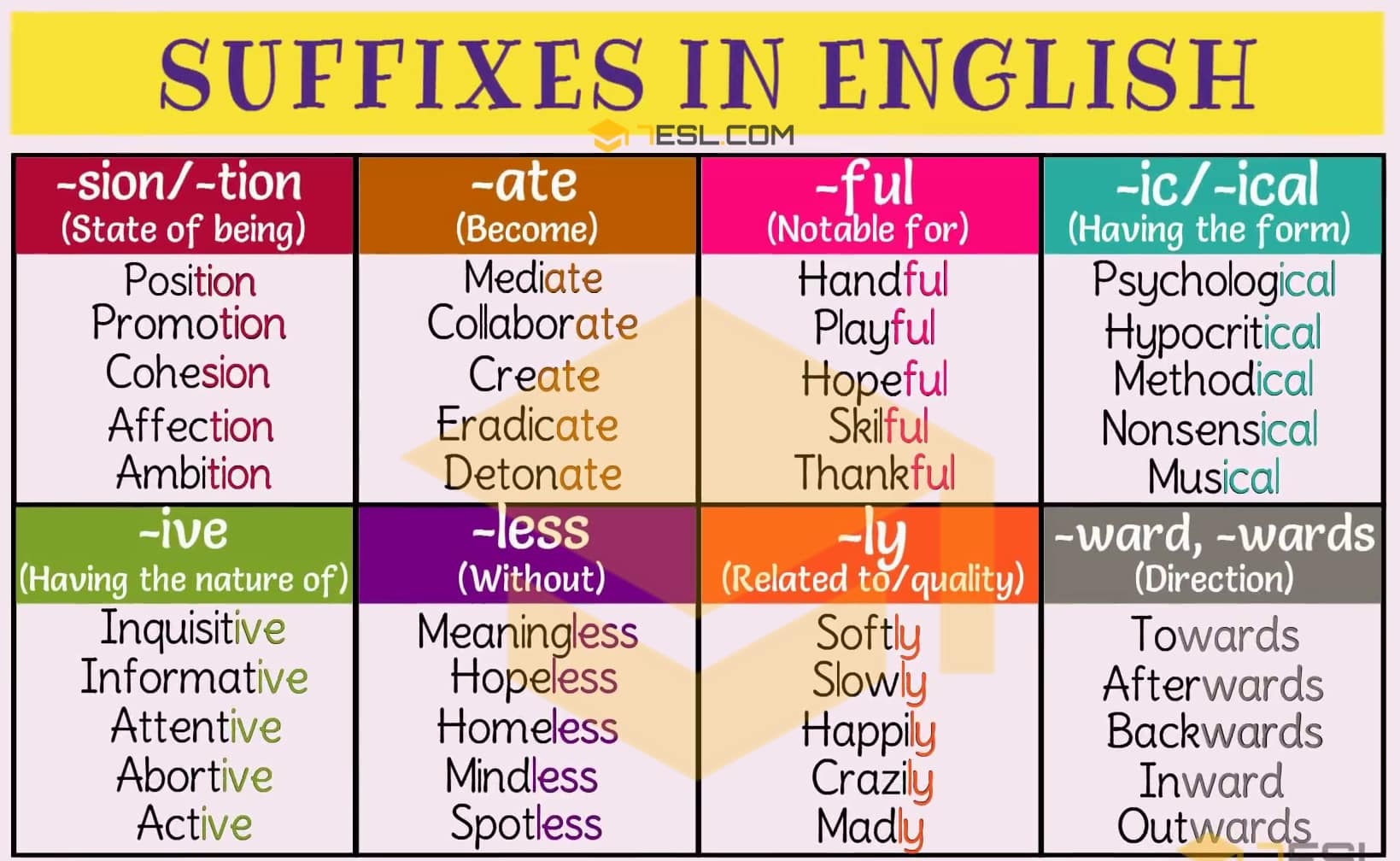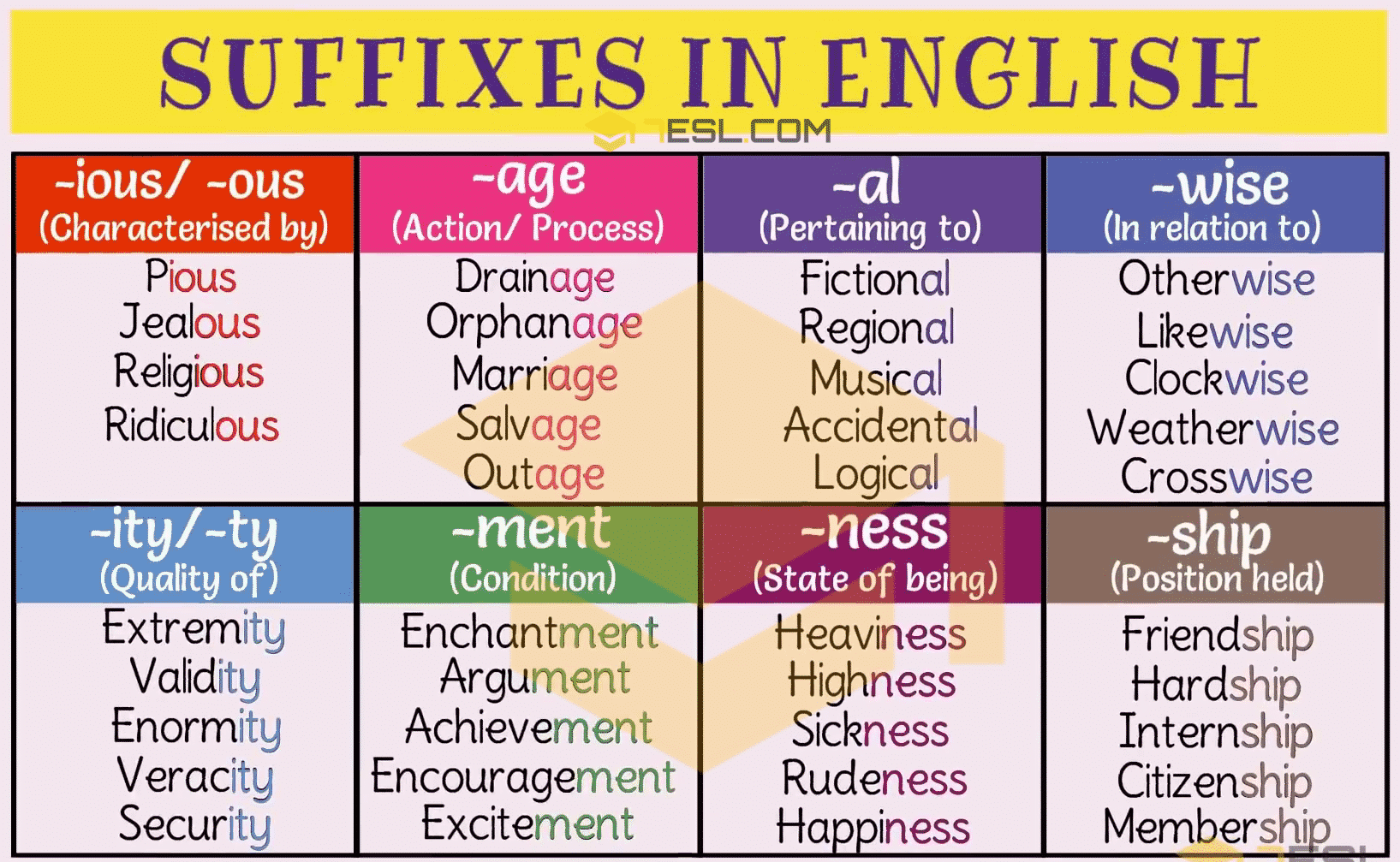SUFFIX: 30+ Common Suffixes (with Meaning & Great Examples)

What are suffixes? A suffix is a tool that you can use to help create more complex words in writing. By changing the ending of a word you can give common words different functions. You can also alter the meaning of the root words.
Suffix in English
What is a Suffix?
You find suffixes at the end of the root word, A suffix forms from a letter or group of letters. When you apply a suffix to the root word a new word emerges.
In English, a suffix is a letter/a group of letters attached to the end of a word to form a new word or to change the grammatical function (part of speech) of the original word. In other words, a suffix is a few letters put at the end of a word to change its meaning.
Sometimes to form a new word the spelling of the base word needs to change. For example, when you add the suffix -ion to the root word “create” you drop the -e at the end of the word. By removing the -e and adding -ion you beget the word creation.
Common Suffixes

A suffix is a type of affix which is attached to the root of a word, only this time, the letters are attached to the end of the word rather than the beginning.
Suffixes reveal the class of the word. Suffixes can denote whether a word is a noun. adjective or something else entirely. You can categorize suffixes based on the function they serve in a sentence. That is to say, you can use suffixes to transform words into adjectives, adverbs, nouns, and verbs.
Suffix Examples
Examples of common suffixes

Adjective Suffixes
- ful (grateful, beautiful, bountiful)
- less (hopeless, baseless, reckless)
- able (capable, creatable, craftable)
- ous or ious (delicious, humourous, gracious)
- ic (stoic, heroic, iconic)
- ‘ive (pensive, expensive, authoritative)
- ant (poignant, extravagant, brilliant)
The ending -ful suggests being full of something while -less means without. -Able refers to things that are capable of being. In contrast. -ious or -ous suffixes suggest having qualities of the root word. Finally, -ic means related to, -ive means nature of, and -ant means being inclined to.
Adverb Suffixes
- ly (bravely, stately, sparingly)
- ward (backward, forward, wayward)
- wise (pennywise, likewise, otherwise)
The adverb suffix -ly refers to how something is being done. You use the ending -ward to suggest a certain direction. Lastly, -wise references a relation to something.
Noun Suffixes
- ion (fusion, revision, opinion)
- ness (roughness, darkness, awareness)
- ment (treatment, abandonment, movement)
- ity (rarity, scarcity, equality)
- er (writer, helper, driver)
- eer (engineer, volunteer, profiteer)
The noun suffix -ion means action while -ness refers to a quality. -Ment reveals the result of action while -ity references a state. Use -er to show someone performing an action and -eer to show an activity being engaged in.
Verb Suffixes
- ed (mended, jumped, coughed)
- ing (running, drifting, smiling)
- er (sooner, faster, quicker)
- en (soften, moisten, fasten)
- ize (memorize, moralize, mesmerize)
We use the verb suffix -ed to represent a past action while we use the verb suffix -ing to represent an action occurring in the present. The -er ending shows a comparison while -en reveals that something is in the process of becoming. Besides, -ize means to become or to cause something.
List of common prefixes in English with examples.
Suffixes
Why Learn Suffixes
Suffixes expand our vocabularies. They provide ample ways to express our thoughts, feeling, and opinions. Without suffixes, we would not be able to transform nouns into verbs. In conclusion, without suffixes, our writings would not show the depth and variety that it currently does.
Noun Suffixes
Noun suffix meaning and examples:
Suffix -acy
- Meaning: State or quality
- Example: Democracy, accuracy, lunacy
Suffix -al
- Suffix meaning: The action or process of
- Example: Remedial, denial, trial, criminal
Suffix -ance, -ence
- Meaning: State or quality of
- Example: Nuisance, ambience, tolerance
Suffix -dom
- Meaning: Place or state of being
- Example: Freedom, stardom, boredom
Suffix -er, -or
- Suffix meaning: Person or object that does a specified action
- Example: Reader, creator, interpreter, inventor, collaborator, teacher
Suffix -ism
- Meaning: Doctrine, belief
- Example: Judaism, scepticism, escapism
Suffix -ist
- Meaning: Person or object that does a specified action
- Example: Geologist, protagonist, sexist, scientist, theorist, communist
Suffix -ity, -ty
- Meaning: Quality of
- Example: Extremity, validity, enormity
Suffix -ment
- Meaning: Condition
- Example: Enchantment, argument
Suffix -ness
- Meaning: State of being
- Example: Heaviness, highness, sickness
Suffix -ship
- Meaning: Position held
- Example: Friendship, hardship, internship
Suffix -sion, -tion
- Meaning: State of being
- Example: Position, promotion, cohesion, ambition
List of suffixes and suffix examples

Verb Suffixes
Verb suffix meaning and examples:
Suffix -ate
- Meaning: Become
- Example: Mediate, collaborate, create
Suffix -en
- Meaning: Become
- Example: Sharpen, strengthen, loosen
Suffix -ify, -fy
- Meaning: Make or become
- Example: Justify, simplify, magnify, satisfy
Suffix -ise, -ize
- Meaning: Become
- Example: Publicise, synthesise, hypnotise
Adjective Suffixes
Adjective suffix definition and examples:
Suffix -able, -ible
- Meaning: Capable of being
- Example: Edible, fallible, incredible, audible
Suffix -al
- Meaning: Having the form or character of
- Example: Fiscal, thermal, herbal, colonial
Suffix -esque
- Meaning: In a manner of or resembling
- Example: Picturesque, burlesque, grotesque
Suffix -ful
- Meaning: Notable for
- Example: Handful, playful, hopeful, skilful
Suffix -ic, -ical
- Meaning: Having the form or character of
- Example: Psychological, hypocritical, methodical, nonsensical, musical
Suffix -ious, -ous
- Meaning: Characterised by
- Example: Pious, jealous, religious, ridiculous
Suffix -ish
- Meaning: Having the quality of
- Example: Squeamish, sheepish, childish
Suffix -ive
- Meaning: Having the nature of
- Example: Inquisitive, informative, attentive
Suffix -less
- Meaning: Without
- Example: Meaningless, hopeless, homeless
Suffix -y
- Meaning: Characterised by
- Example: Dainty, beauty, airy, jealousy
Adverb Suffixes
Adverb suffix meaning and examples:
Suffix -ly
- Suffix definition: Related to or quality
- Examples: Softly, slowly, happily, crazily, madly
Suffix -ward, -wards
- Suffix meaning: Direction
- Examples: Towards, afterwards, backwards, inward
Suffix -wise
- Meaning: In relation to
- Example: Otherwise, likewise, clockwise
Suffix Video
At 7ESL, we empower English learners with advanced AI technology. Our innovative tools and resources help users speak fluently and improve their writing skills, supporting learners at every level in mastering English.
Latest posts by Isabella Claire (see all)
- 10 Rare Words for Expanding Your English Vocabulary - June 5, 2024
- What Does the Term “Hypocritical” Mean? - January 27, 2024
- SWAG Meaning: What Does it Mean? - January 25, 2024





